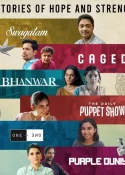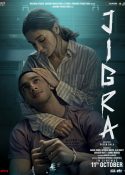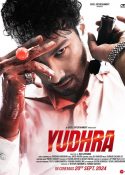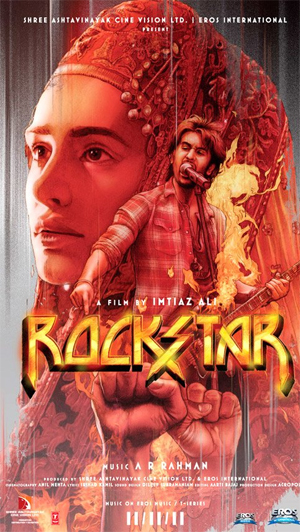 AR Rahman seemed like a novel choice for scoring the music of Rockstar. We all love his Sufi tinged numbers and techno pop songs, but with an album like Rockstar the listener and fan has to go in with an interesting set of expectations. Will Rahman be any good at composing full on rock tracks as comfortably as Shankar-Ehsaan-Loy did for Rock On? Certainly from the exciting promos of the film, with Ranbir looking like a grungy rocker singing with Mohit Chauhan’s gritty voice. From the snippets of the songs, they immediately hooked you in and told a gradual evolution of the titular Rockstar’s roots of Sufi soft rock to full-blown grunge in Sadda Haq. Certainly, a lot is riding on the music to Rockstar, as critics weren’t fans of Rahman’s last outing in Robot, and Imtiaz Ali is testing waters with a new composer for such an awaited film. Obviously, from the title, expectations are high for the music to create something new within the rock and roll genre especially when other composers like Amit Trivedi, and Ram Sampath have been experimenting with the punk and rock genres with their albums.
AR Rahman seemed like a novel choice for scoring the music of Rockstar. We all love his Sufi tinged numbers and techno pop songs, but with an album like Rockstar the listener and fan has to go in with an interesting set of expectations. Will Rahman be any good at composing full on rock tracks as comfortably as Shankar-Ehsaan-Loy did for Rock On? Certainly from the exciting promos of the film, with Ranbir looking like a grungy rocker singing with Mohit Chauhan’s gritty voice. From the snippets of the songs, they immediately hooked you in and told a gradual evolution of the titular Rockstar’s roots of Sufi soft rock to full-blown grunge in Sadda Haq. Certainly, a lot is riding on the music to Rockstar, as critics weren’t fans of Rahman’s last outing in Robot, and Imtiaz Ali is testing waters with a new composer for such an awaited film. Obviously, from the title, expectations are high for the music to create something new within the rock and roll genre especially when other composers like Amit Trivedi, and Ram Sampath have been experimenting with the punk and rock genres with their albums.
We hit the ground running with the lovely Phir Ud Se Chala, which opens with a harmonious choir fading in and out while a mandolin strums in the back. This soulful piece also has eloquent lyrics by Irshad Kamil which almost sound like tongue twisters the way Chauhan pulls them off with such verve. The message of flying and letting go of inhibitions can get cliché but Kamil’s lyrics are so energetic in its imagery and evokes a very dreamy feel to the song. During the bridge, the song completes veers into remix territory yet this does sound at all bad, it just enhances the breezy quality of Chauhan’s voice. When the song starts to close out, we again hear the hypnotic choir that opened the track. This is one song that goes full circle and ends up a winner.
The haunting Jo Bhi Main opens with that catchy ‘Ya-ya-ya’ by Mohit Chauhan, but follows with the audience echoing the chorus back to him. The use of the audience and singer vocals is effective in giving the song a bit of a backstory as provided by the picturisation as well. However, the composition is equally hypnotic with the early soft rock sound with the understated electric guitar in the back, and the fabulous bass line throughout the track. Chauhan’s vocals are amazing in this song, as he sounds like he’s improvising throughout during the musical solos as well which gives the song a very authentic live concert sound. Near the end, the audience sings the chorus back to Chauhan, which works seamlessly with the improvised jam session the song suggests.
There has to be one universal popular song that works for commercial reasons, and Katiya Karoon is just that song. The supremely catchy chorus of ‘tinga-ling-tinga-linga’ immediately ensures its popularity, but its Harshdeep Kaur’s fabulous vocals, which make the song, go beyond its intentioned value. Kaur has a voice reminiscent of Richa Sharma in terms of power, but she has a huskier tone, which sounds so pure and fun at the same time. The orchestration of the song too is wonderful in integrating the Punjabi sound with the playful tumbhi in the back alongside a dholak beat. But at heart it’s Harshdeep Kaur who elevates the track to a better level.
If you’re awaiting a Sufi number, then Kun Faaya Kun lets you in for a treat! AR Rahman’s Sufi songs are always melodious and instant hits, and this one is no different. Reuniting with Javed Ali, Rahman creates another devotional number that rivals ‘Arziyan’ from Dehli 6 with its sheer power and beautiful composition. The song is the longest on the album, clocking in at 8 minutes though it’s all well spent listening to the three singers play off each other. Javed Ali’s honey-dipped voice and AR Rahman’s huskier tone sound perfect together, and Mohit Chauhan chimes in at times and one senses it’s truly the masters teaching the new kid how to excel here. The plodding harmonium at the beginning sets the tone for the rest of the instruments like the tabla to provide a great background composition to the singers to work in harmony with. And it totally works, one of the best on the album.
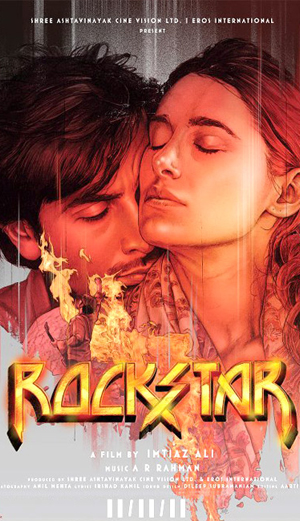 The fun number, Sheher Mein, takes place in the recording studio with interludes by the music producer correcting both Mohit and Karthik. It is bound to get some laughs on screen but as a track, it does suffer from too much talking and simplistic lyrics. Yet the track does allow Mohit Chauhan to flaunt his more modern voice as a contrast to Karthik’s traditional vocals. The music does improve the track, starting from a funky keyboard bit, but after each music producer quip there is an addition of various Indian instruments and by the end, it sounds pretty good. A very innovative track but nothing special.
The fun number, Sheher Mein, takes place in the recording studio with interludes by the music producer correcting both Mohit and Karthik. It is bound to get some laughs on screen but as a track, it does suffer from too much talking and simplistic lyrics. Yet the track does allow Mohit Chauhan to flaunt his more modern voice as a contrast to Karthik’s traditional vocals. The music does improve the track, starting from a funky keyboard bit, but after each music producer quip there is an addition of various Indian instruments and by the end, it sounds pretty good. A very innovative track but nothing special.
Haawa Haawa starts with an arresting accordion that gives way to a very Middle Eastern and almost Hungarian sound. The Spanish guitar also sounds so fresh alongside Mohit Chauhan’s experimental voice in this track. Chauhan really lets himself go and has fun alongside the varying styles of music behind him. The female chorus of Tanvi Shah, Viviane, and Shalini also make their presence with their bellowing of the chorus and sometimes with the distracting back talk. However, the composition of the track is exceptional and gets you in a dancing mood. The merging of all these different influences is seamless and does not sound superfluous at all.
Alma Ferovic opens Aur Ho, with her dreamy and haunting singing, and then we have the brooding bass riff in the back, which sounds so grungy and finally rock-ish too! Mohit Chauhan begins with a very affected and hurt voice, which fits the lyrics perfectly. When he launches into the chorus, he bellows like a proper brooding Cobain would and the music rises with him. The pulsating drums and jangly guitar riff add so much to the helplessness of the song lyrics. Ferovic puts her all into her interludes alongside Chauhan and they both sound full of rage and angst, which makes this song one of the best on the album. The lyrics are so beautiful in conveying the Rockstar’s loss of his love and his helplessness in this situation. Chauhan sounds so spent and disillusioned by the end of the track and it works marvellously in conveying a narrative within the song.
The next one is an interesting instrumental track, Tango for Taj, which ones assumes might be set at the Taj Mahal. A very Parisian sounding track that would seem right at home on Rahman’s previous album Yuvvraaj but seems rather odd on an album like this. However, it does sound nice all the same.
The album manages to save face with Tum Ko, featuring Kavita Subramaniam back to the mike after such a long hiatus and with a music director who gave us ‘Tu Hi Re’. It is so heartening to hear Subramaniam’s voice gracing a fabulous track like this one. Following the same theme, which appears in the Dichotomy of Fame, Rahman makes a proper song of it with the addition of a lovely tabla beat and beautiful orchestration of strings in the back. Subramaniam sounds just as wonderful as she did in her heyday and one wishes she would sing for more films, but it is lovely that she graced a lush song like this.
Another much better instrumental is The Dichotomy of Fame, which features a merging of the shehnaii, table, and the guitar. This is an exceptional track that spotlights Rahman’s merging of diverse styles of music, with Balesh on the shehnaii and Kabuli on the guitar equally sharing the solos.
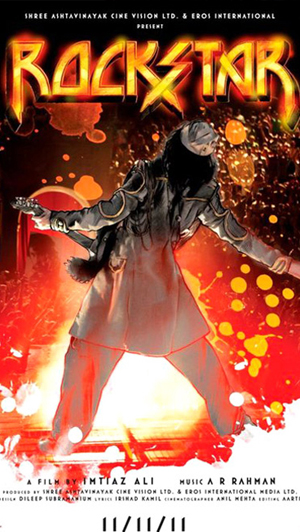 The next sombre track is Nadaan Parindey, which opens almost angelically and then segues for an aggressive electric guitar riff alongside a fabulous drum showcase. If you were hoping for this one to turn into a full on rock track, then this track really does let you down with that fabulous intro. It turns into a flat soft rock song punctuated with an average bass riff and then AR Rahman steps in to hopefully salvage it with his vocals and he does to some extent. The tempo speeds up to allow for a few rough riffs, and finally the bridge reclaims the early glory with a nice guitar solo and duels off with the drums. Then the song returns to the verse, there is a discordant lead in back to the indie rock sound. Overall, the excellent guitar and drum solos and Chauhan and Rahman’s gorgeous vocals save the song at times. Yet the song needed a bit more of a kick, instead of peppering these hard rock interludes around a very averagely composed indie rock song. This makes you wonder whether the second half of the album is going to continue to veer off track!
The next sombre track is Nadaan Parindey, which opens almost angelically and then segues for an aggressive electric guitar riff alongside a fabulous drum showcase. If you were hoping for this one to turn into a full on rock track, then this track really does let you down with that fabulous intro. It turns into a flat soft rock song punctuated with an average bass riff and then AR Rahman steps in to hopefully salvage it with his vocals and he does to some extent. The tempo speeds up to allow for a few rough riffs, and finally the bridge reclaims the early glory with a nice guitar solo and duels off with the drums. Then the song returns to the verse, there is a discordant lead in back to the indie rock sound. Overall, the excellent guitar and drum solos and Chauhan and Rahman’s gorgeous vocals save the song at times. Yet the song needed a bit more of a kick, instead of peppering these hard rock interludes around a very averagely composed indie rock song. This makes you wonder whether the second half of the album is going to continue to veer off track!
Another favourite is Tum Ho, which is another soft rock love song, but here the music and lyrics work well together. Mohit Chauhan’s voice is perfect on this track, going from brooding to haunting in the space of a few measures; he makes this track his own. Suzanne D’Mello’s humming in the back gives the song a lovely dreamy mood. The lyrics too are so simple but so achingly romantic when sung by Chauhan who makes this song worth many replays!
FINALLY! We get to the song that has been capturing the nation, Sadda Haq, which is worth the entire wait. With a rollicking jagged riff by Orianthi Panagaris, the lead guitarist for the late Michael Jackson’s tour band, the song enters full on rock territory! After this hearing this awesome track, one hoped that many of the songs on the album would have the power and punch of this utterly rocking track. Chauhan is turns his vocals up to ‘11’ and really works in absolute harmony with the Orianthi’s potent riffs and the reverberating chorus. The guitar solos are so boisterous and remind this reviewer of Brian May from Queen’s riffs but that it works so seamlessly in an Indian song like this. it is a testament to Rahman’s good risk taking! It enters proper rock n roll area with a mix of breathtaking music with devil-may-care lyrics that call out on The Man.
We end the album with, Meeting Place, which has a magical and spooky mood to it and has Ranbir uttering a Rumi line. This is all well and good but this really did not need to finish the album.
The Rockstar album does fulfill the main requirements, Rahman has reclaimed his title as one of the most innovative music directors in the industry, and the music is very good. Yet this is all surface level, the music as lovely and easy on the ears as it is, does not really get into the rock ‘n roll swing of things, barring Sadda Haq and Jo Bhi Main, the album is very indie rock which seems at odds with the promos of the aggressive and grungy Ranbir. Yet this is also Rahman stepping out of his comfort zone and attempting an album that appeals across the board and he does succeed in that. The album has a song for all to enjoy, a Punjabi number, a Sufi one, love songs, and a middling mash of everything. Definitely check it out as there is definitely something to love and like and maybe to admire from afar.


